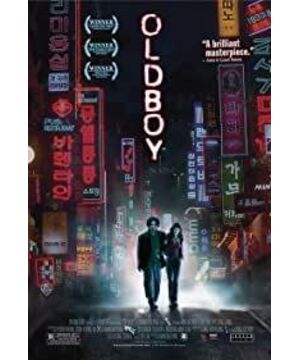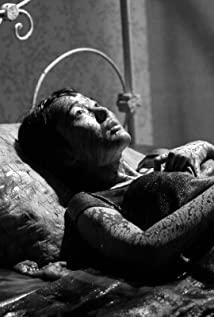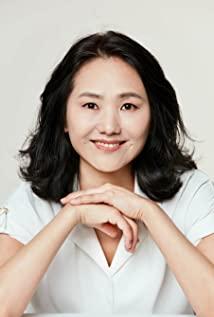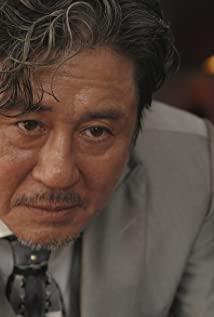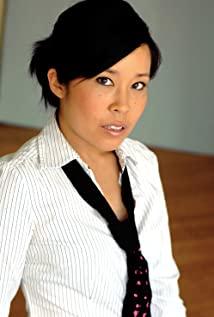The film language of
"Old Boy" can be described as extremely stylized. Park Chan-wook is not from a major. He graduated from the Department of Philosophy at Sogang University in South Korea, but loves movies. In fact, like Chu Fu, he turned from a film critic to a director. This is also destined for him to watch a huge amount of film, so as to learn from the advantages of the film language. Of course, because he is a fan of B-level movies and cult movies, he often plays cards unreasonably.
First, let’s analyze the comprehensive film language usage at the beginning of the film. The first shot started with a close-up of the tie held in one hand, and gradually pulled to Wu Daxiu's backlit facial close-up (no other background, high-contrast hard light), and then switched to the jumper to explain the environment. The soundtrack is very tense. In just a few seconds, a strong dramatic tension has been established, which has set the tone for the entire film. Most viewers thought it was Wu Daxiu who was going to persecute the jumpers. At this time, the camera suddenly switched to the beginning of the story, when a drunk Wu Daxiu made trouble at the police station. Using ordinary lighting and natural sound, documentary-style rough editing, Wu Daxiu back then was completely like a middle-aged uncle office worker. Both the image and the funny and peaceful atmosphere are in sharp contrast with the original shots. However, this scene also assumed multiple narrative functions. It not only explained Wu Daxiu's original identity, but also contrasted with subsequent films. It also mentioned his daughter, which can be said to be the first foreshadowing. The scene was converted to a phone booth, which was initially still a documentary rough cut. However, with Wu Daxiu’s disappearance, it was converted to a track shot and gradually increased to become a depression angle shot. The natural sound faded, and a theme soundtrack that reminded the plot to advance appeared multiple times throughout the film. Appear. It is worth noting that the depression angle shots in "Old Boy" appeared four times, except here, when Wu Daxiu left the confinement room, the first encounter with mido, and the end of the film's hypnosis. Generally speaking, depression-angle lenses are often religious because they imply omniscience (see "I Want Revenge"), but there is no religion involved in this film, which is closer to the fateful reminder, because every time the depression-angle lens appears, it implies The turning point of the protagonist's fate. Just at the beginning, the director's few pens and inks firmly attracted the attention of the audience, created a strong dramatic tension, and laid the necessary pavement for the progress of the plot.
And there are many other excellent lens language applications. For example, spatial processing through a wide-angle lens. The first wide-angle lens appeared after Wu Daxiu entered the confinement room, and after a group of very depressive very low camera shots (showing his head from under the door), he explained the entire room environment from behind Wu Daxiu. However, due to the effect of the wide-angle lens, the entire space is confined within the lens, still confined and depressed. The second one is almost a fisheye lens. It appeared after Wu Daxiu walked out of the confinement room and saw a woman in the elevator for the first time in 15 years. Through the use of fisheye lenses, although Wu Daxiu restrained himself from clinging to the elevator, his hands still seemed to hug a woman. The other was also used in the room. Wu Daxiu entered the room where he spied himself. When he met Li Youzhen and his bodyguard, the use of the fisheye lens made Wu Daxiu seem to have stepped into a trap, a game that Li Youzhen carefully arranged.
As for Wu Daxiu's long shots of fighting with a bunch of punks in the hallway where he was imprisoned, it can almost become a textbook of violent aesthetics. The three-minute fight was completed by a horizontally-shifted shot, and the scenes in it were well-rounded. At first glance, the chaotic but the rhythm is exquisite, just like a symphony. The soundtrack used is called "a lonely place", which is extremely ironic. (It is worth mentioning that each title of this OST is the name of another movie.)
Park Chan Wook is also quite original in the use of depth of field. For example, in the office of Li Youzhen, Park Chan-wook used a lot of exaggerated depth-of-field shots that were comparable to the scenes of Kane and Susan in the castle in "Citizen Kane". He used a mirror to put the face of Li Youzhen in the near view (while facing the audience), Wu Daxiu in the distant view, and the pictures of Li Youzhen's sister (sister?) on the distant view wall together, and then flashed into the waiting mido in the imprisoned room on the other side from time to time. Picture. On the one hand, it reminds the psychological distance between the two enemies. On the other hand, it can be said that the core contradictions of the story are all intertwined in this set of shots and are about to explode. (And mido's flashing in is not obtrusive because of the continuation of a previous dislocation cross-editing.)
An example of shallow depth of field use is a group of Wu Daxiu who went downstairs after leaving the confinement room. After Wu Daxiu left the room, the woman in the elevator was still complaining to the police. The police tried to stop Wu Daxiu, and even the previous jumper fell from the stairs at this time. These seemingly fierce incidents were all processed with out of focus, and the lens was always firmly locked in the close-up of Wu Daxiu's face, showing that he was determined in his heart and completely ignored the outside world.
Park Chan-wook also likes to use sudden still shots similar to Takeshi Kitano to create contrast or absurd effects. For example, pulling the tie of the jumper at the beginning of the film, the beginning of a few fights, and so on. For example, at the beginning of the section about finding clues through dumplings, suddenly cut into a still shot of mido sandwiching dumplings to Wu Daxiu, using exaggerated modeling to indicate that dumplings here are the key clues to the puzzle.
The contrast effect of knowing how to control also distinguishes Park Chan-wook from postmodern & violent directors such as Gary, Rodriguez, Takashi Miike, Shinya Tsukamoto, and closer to Quentin Tarantino and Takeshi Kitano. (Perhaps this is one of the reasons why Quentin awarded the Cannes Jury Award to this film.) In addition to the unconventional handling of the violence part, many details can also be seen in the director's understanding of temperance: when mido is in a normal On the street in Beijing, I asked Wu Daxiu if he wanted to go to his wife’s tomb. Under the daily atmosphere created by natural sound effects and portable photography, Wu Daxiu suddenly turned his head, revealing an extremely painful expression. Without special means and soundtrack, it was even more shocking. Human heart. (This is even more pronounced in "I Want Revenge". Almost all scenes where the characters burst out of emotion or have violent conflicts are shot with a distant view.) There is a parallel montage of Li Youzhen, who is doing yoga, and roaring angry in the car. Wu Daxiu's repeated switching. At first glance, it looks like a contrast between pain and calm, but in fact, Li Youzhen, who can only be temporarily relieved through yoga, suffers far more than Wu Daxiu at this time. This is actually a contrast between pain and more pain. This set of shots Li Youzhen ended with a tear, but it was full of energy.
From a narrative point of view, Park Chan-wook's suspense and foreshadowing settings are even more amazing. A series of suspense settings at the beginning of the film constantly stimulate the curiosity of the audience. In addition to the number of suspense, the rhythm of the suspense is also just right. For example, after the exciting and intense corridor group drama, the audience just breathed a sigh of relief, and immediately discovered that the ordinary passerby who helped Wu Daxiu was actually the ultimate villain. The first half of the film is almost always wave after wave without gaps.
Except for some of the more obvious ones that simply serve the plot, some of the foreshadowing settings of the film are even more meaningful and worth exploring. When Li Youzhen called Wu Daxiu for the first time, and Wu Daxiu asked why he was detained for 15 years, the camera happened to take mido and Wu Daxiu together, which was a hint from the director with ulterior motives. Although there is hypnotism as an explanation, Wu Daxiu and mido were familiar with each other when they met for the first time, which was quite teasing. Li Youzhen also said that no matter how smart hypnotism is, it is not so easy to make two people fall in love. It is conceivable that the inner loneliness of mido, who had not been cared by his father since he was a child (the ant-man metaphor was also used later), meets a middle-aged man with a paternal taste like Wu Daxiu, the emergence of the electra complex is actually not strangeness.
Another interesting foreshadowing is the two portraits in the confinement room of Wu Daxiu. One is a hideous expressionist portrait, which undoubtedly alludes to Wu Daxiu himself. The other is a painting of a girl praying, which should hint at the mido appearing behind. Regarding this foreshadowing, I will continue to discuss it later in the discussion on the theme of the film.
The director also knows how to mobilize the audience's psychology. For example, at the beginning, the audience thought that Wu Daxiu was going to kill the jumper, and then found out that it was a rescue. For example, through the advancement of the plot, the audience makes multiple speculations and corrections on the identity of mido, so that the audience finally finds that mido is the daughter of Wu Daxiu (although the director has already hinted on the camera as mentioned above).
A more technical problem in narrative is how to tell such a complicated story (and using many techniques) clearly in 2 hours. The versatility of the narrative and the simplicity of the mirror are the two magic weapons of Park Chan-wook. As mentioned above, the first few seconds of the film have already given a lot of information. Here is another example. After Wu Daxiu came out of the confinement room, he wandered the street and encountered a group of street gangsters and clashed with them. On the one hand, this drama satisfies the psychological needs of the audience (the protagonist finally has a vent after a long period of depression), on the other hand it explains the changes in the external environment (through the trendy curse language of the gangsters, Wu Daxiu has never heard of it), And the changes in Wu Daxiu's body and mind in the past 15 years (virtual training made him become a martial artist, which made it possible to revenge afterwards. At the same time, he learned a lot of knowledge through TV, but the TV did not teach people to swear).
And Park Chan-yu’s Ximo Rujin has become an inseparable part of his personal style. The way he advances the plot has brought the effect of montage to the limit. Wu Daxiu used dumplings to find the building where he was imprisoned. A scene was completed with only three short shots: eating dumplings, chasing takeaway guys, and going to the elevator of the building. When Wu Daxiu went to the Internet cafe to find his old classmate, there were only two shots: the old classmate's surprised expression-the two embraced, saving all the greetings. This kind of jump cut requires excellent heat control, because if the context is slightly unclear, it will easily cause the audience to misunderstand. In fact, Park Chan-wook’s simplicity and the versatility of narrative paragraphs complement each other. Formally through these methods, Park Chan-wook has more time to portray the parts he needs to portray carefully, without affecting the explanation of the plot (instead, it gives the audience a cool feeling). In contrast, the narrative skills of many Chinese directors are much inferior. They must use large lines to advance the plot and express the emotions of the characters. The film is very long but hardly tells much.
Another commendable factor is that Park Chan-wook, unlike some modern or post-modern directors, often only gives a vague ending after giving an extremely attractive gimmick at the beginning. This technique is okay occasionally (for example, Bong Joon-ho's "Memories of Murder"), but when used too much, one can't help but doubt the ability of the screenwriter, and it also makes many avant-garde movies be labeled as mysticism. Park Chan-wook usually attracts the audience with peculiar gimmicks, which brings people great viewing enjoyment, and then gradually slows down the rhythm as the film advances, solves the gimmicks, introduces themes, and makes people think deeply.
Let's talk about the art style of "Old Boy". Most of the time, the film uses low-key photography similar to "The Godfather". Black and cold color blocks often dominate the screen to match the heavy theme of the film, but it is not entirely the case. In a scene in the hotel where Wu Daxiu had sex with mido, red and green filters were added to the lens to make the atmosphere ambiguous, almost bringing the style of Du Kefeng. The high-contrast hard light at the beginning of the film shows a little film noir tradition. The snow scene at the end is beautifully shot again, no wonder someone commented that it was like the beginning of Iwai Shunji's "Love Letter". (This kind of photography style, in line with the change of plot and theme, is also very prominent in "The Kind Gold". But in "I Want Revenge", Park Chan-wook uses a contrast method, placing almost all the tragic stories in Shoot in broad daylight.)
Several surrealist passages in the film are also very interesting. The metaphor of ants appeared twice, once to express Wu Daxiu's pain and anger, and once to express mido's loneliness. I don't know what Dali felt when he saw Park Chan-wook's transformation. But even more exciting are the less obvious passages. Especially in the dark red-walled room of the hotel, Li Youzhen, in a suit and leather shoe with a gas mask, lies beside the naked Wu Daxiu and Mido, enjoying the pleasure of revenge, surrounded by floating anesthetic gas, and Li Youzhen’s bodyguard ( The same suit and leather shoes with a gas mask). This wonderful picture can be said to perfectly demonstrate Breton's aesthetics. Of course, there is also the unique modernist design of Li Youzhen's office.
Musically, the OST created by Yeong-wook Jo has some Philip Glass flavor, especially the tense arpeggio style that reminds the theme of fate and the advancement of the plot. It is very interesting that when Wu Daxiu performed tooth extractions on prison guards, the music used was the first movement of Vivaldi's "Four Seasons" in "Winter". Each movement of "Four Seasons" has a corresponding verse, and the first movement of "Winter" happened to be like this "Ice and snow, the wind is biting, people are trembling, their teeth trembled, and their bodies are frozen." Then the prison guards retaliated. Wu Daxiu wanted to return his body in the same way as a human being. When Wu Daxiu's teeth began to tremble, this movement sounded again.
Movie theme
If there is something criticized in "Old Boy", it may be the theme. Many people think that the theme of this film is relatively shallow, more like "Kill Bill" as the most audio-visual entertainment work. However, Korean directors are different from directors such as Quentin and Gerich because of their oriental cultural heritage. It is difficult for them to shoot purely "light" works such as "Falling Water Dog", "Two Smoking Guns" and "Sin City". It is inevitable for them to add a "heavy" to their works. To a certain extent, this film reveals some film noir traditions (that is, there is almost no absolute evil, and the individual's fate is always in the squeeze of the social system, and ultimately leads to the tragedy of destruction), we can still see some of the director's direction. Is the tragedy of Li Youzhen and his sister really caused by a word from Wu Daxiu? Obviously not, but because of the terrible violence against incest by the traditional ethical concepts of the entire society. The social imprisonment of individuals is the real murderer and the source of Li Youzhen's perverted revenge plan. Because he could not find a real revenge object, he could not avenge the ethical system of the entire society. He knew that Wu Daxiu was not the real murderer, so simply killing Wu Daxiu had nothing to do with revenge. Only by creating incest to avenge incest can he show the society his last desperate struggle. In the end, Wu Da trimmed off his tongue, which also symbolized the destruction of such social murderous "speech".
At the end of the film, it was shot in the mountains in heavy snow. The mountains far away from society are also far away from the social system that imprisons people, and the silent and pure white snow seems to have eliminated those deadly "rumors" and washed away all sins. But the real salvation may be the last sentence of mido, "Wu Daxiu, I love you." The incestuous love between Li Youzhen and his sister was destroyed by the social ethical system, but the incestuous love between Wu Daxiu and mido finally broke through all the imprisonment. In the director's view, only love is all-inclusive, and Wu Daxiu actively chose to use hypnosis to forget that mido is his daughter's memory, and he also achieved real salvation for himself and even for Li through love. Let’s continue to talk about the metaphor of the two portraits mentioned in the previous article. It can be seen that the director hinted at the beginning of the film that the praying girl (Mido’s love) will complete the salvation of the angry people (Wu Daxiu, and even Li Youzhen). It is worth noting that when Wu Daxiu finally went to Li Youzhen's office for a decisive battle, mido was confined in the previous confinement room to pray for Wu Daxiu (and she put herself on angel wings very innocently).
In the film, Wu Daxiu's actor Cui Minzhi needs no words, and his performance is perfect. Mido played by Jiang Hye Jung is also very good and natural enough. But what I think needs to be specifically mentioned is the outstanding performance of Li Youzhen’s actor Liu Zhitai. He didn't portray Li Youzhen as a common maddening perverted avenger, but a real flesh and blood. This kind of hatred and pain that has been endured for more than ten years is actually more difficult to express than Wu Daxiu's exposure. And Liu Zhitai, the actor, even between his eyebrows, makes people always feel a kind of purity (so in the end he did not open the box in front of mido). When the character laughs, I can deeply feel the pain of the character. In fact, Liu Zhitai's truly famous work is the pure love film "The Passing of Spring" directed by Xu Qinhao and co-starred with Li Yingai. The freshness and purity of "Spring Passes" even surpasses "August Photo Gallery". I have to admire Park Chan-wook’s casting vision, and Liu Ji-tae’s own temperament is just enough to make Li Youzhen’s role more plump.
If you look at the film from the perspective of the entire trilogy, you can also see interesting trajectories. In the trilogy, the ending of "I Want Revenge" is the most desperate, and all the characters die. Both "Old Boy" and "Kind Gold" end in the snow, showing the existence of hope; "I Want Revenge" was filmed extremely Forbearing, but very tragic, "Old Boy" is more balanced in the center, "Friendly Gold" is almost dazzling, very gorgeous; in the theme, "I Want Revenge" can vaguely see some religious factors, "Old Boy" is dark Refers to social criticism. In "The Kindly Gold", both religion and social criticism are displayed in the film. I believe that if the audience can fully watch the entire trilogy and understand it as a whole, they will definitely have a deeper understanding of the director's intentions.
Contrast with the sixth generation of directors in China
This wave of Korean movies does not have a unified style or manifesto. The directors have different styles. In addition to Park Chan-wook analyzed in this article, there are also Kim Ki-duk, who takes the standard art film route, and Bong Joon-ho, who is also sharp and energetic, and Lee Cang-dong, who was originally a writer and has a strong literary breath, is good at fresh themes and emotional themes. Xu Qinhao, Guo Zairong, who pays more attention to commercial effects, etc., are indeed blooming. What's more valuable is that the emergence of excellent films is also accompanied by the unprecedented prosperity of the domestic film market and the maturity of the film industry and laws and regulations. However, the comparison of the new generation of directors in my country is a bit disappointing. Most directors have stayed under the influence of Italian neo-realism for a long time, and the subject matter (and very simple) is larger than the language of the film, so they are easy to be accused of flattering foreign judges (for Li Yang's "Blind Well" Jia Zhangke's "Xiao Wu" Etc.). Even those who try avant-garde techniques often end up being incomprehensible and unacceptable to ordinary audiences (represented by Zhang Yuan's "East Palace and West Palace" and Jiang Wen's "Sun Also Rises", etc.). Trying to return to the mainstream market, but becoming almost kitsch without depth (represented by Zhang Yang, "Love Spicy", Zhang Yuan, "I Love You", etc.). There are also attempts to learn post-modern techniques to return to narrative, but they are still inadequate (represented by Lu Chuan's "Looking for a Gun", of course, Ning Hao's "Crazy Stone" is already very popular, but after all, imitating Garic is too serious). The worst thing is that some movies that have been circulating for many years have returned to the original place. Except for the outer shell of an independent movie, the ideology has begun to be the main theme of the movie (see Wang Quanan's "Tuya's Marriage" and Wang Xiaoshuai's "Left and Right" Gao Daquan).
In short, the lack of control of fresh film skills, poor narrative ability, insufficient depth of thought, single style, and loss of self-positioning have become the key bottlenecks restricting contemporary Chinese directors. And more importantly, the collective seriously lacks market appeal. How to solve this problem is not the main point of this article, perhaps learning from Korean films is one of the ways.
http://fredlaw.blogbus.com/
View more about Oldboy reviews


